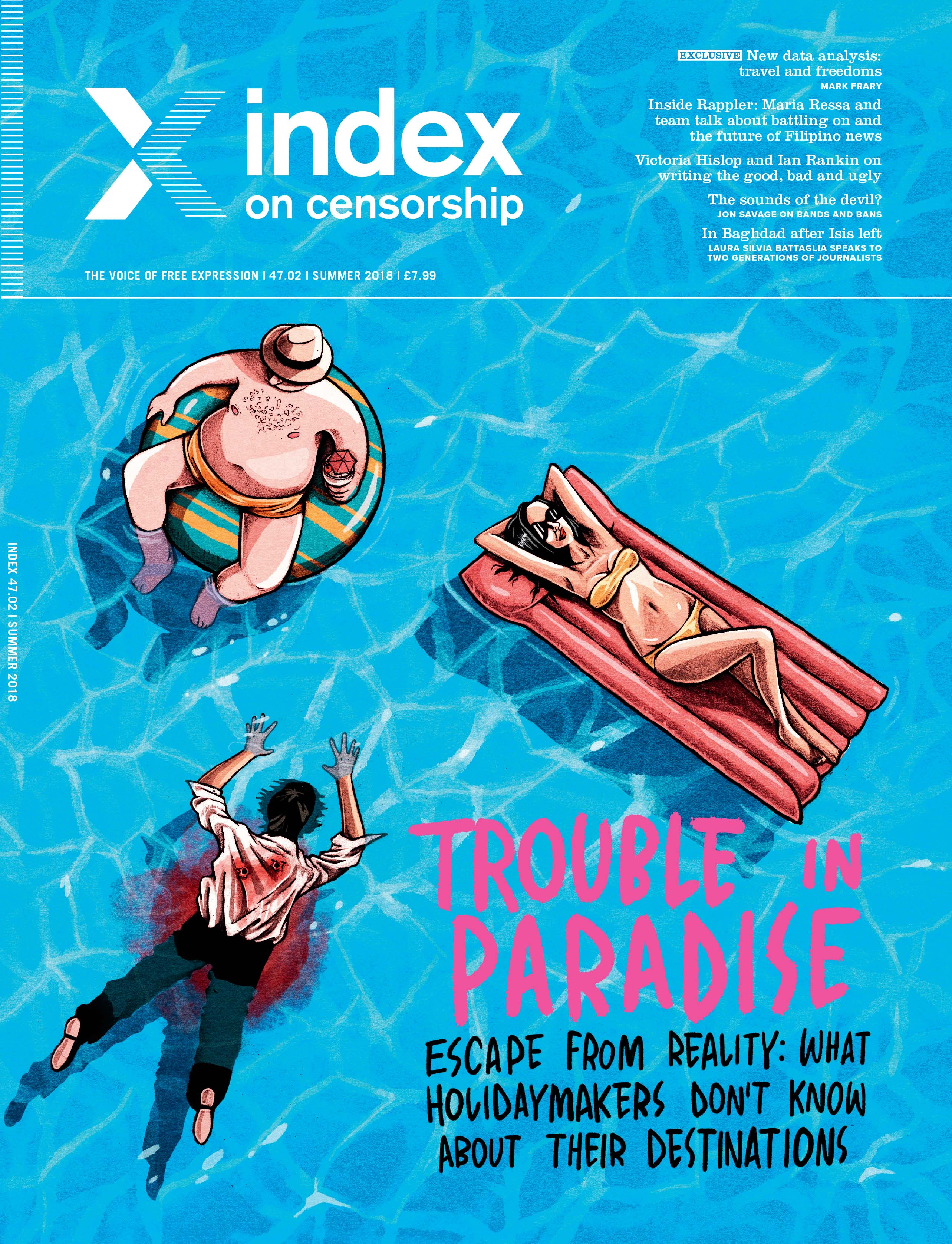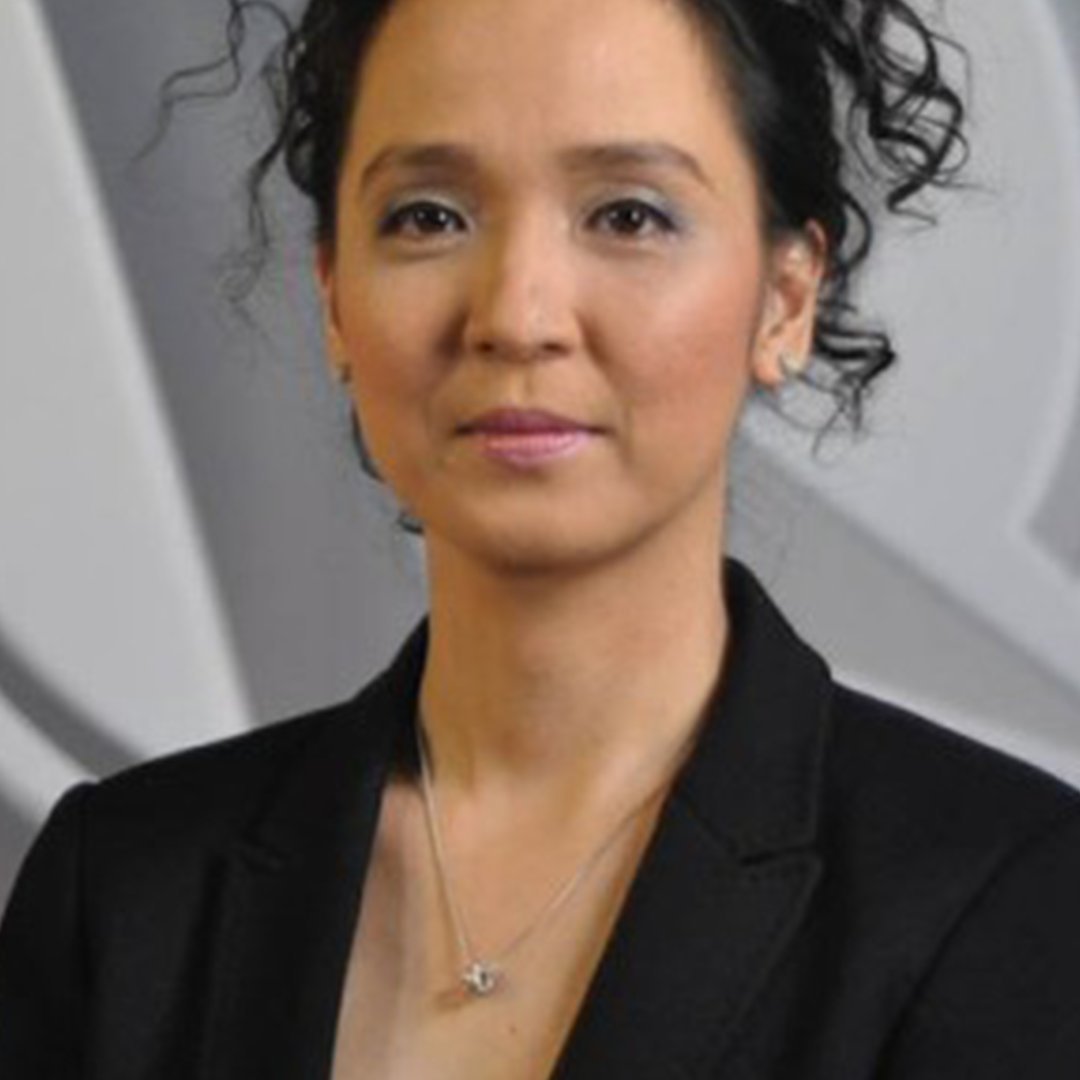26 Jun 18 | Magazine, News and features, Press Releases
[vc_row][vc_column][vc_column_text]
— Index special issue finds the dark side of summer holiday destinations not being reported on travel sites
— Editor calls on travel journalists to tell the whole story
— July 4 debate in London’s Book Club
 With holidaymakers packing up for their summer trips, a new issue of Index on Censorship magazine reveals the uglier side of countries with tourist appeal and calls on travel writers to do more to give travellers the whole picture.
With holidaymakers packing up for their summer trips, a new issue of Index on Censorship magazine reveals the uglier side of countries with tourist appeal and calls on travel writers to do more to give travellers the whole picture.
Index editor Rachael Jolley said: “On travel websites for popular destinations like Mexico, Maldives and Malta there is little sign of the crackdown on freedoms we are seeing in these nations. From the horrific numbers of journalists being killed in Mexico, to the murder of journalist Daphne Caruana Galizia in Malta, and anti-Muslim riots in Sri Lanka, with worshippers attacked on the way to mosques.
“I would like to see travel journalists do more to tell the whole story. With fewer travellers carrying print travel guides, which traditionally did give more background on political tensions and freedoms, digital versions need to step up to give travellers the full range of information, rather than just the glossy bits.”
“With many countries depending on travel spending as a vital part of their economy, the travel industry can also do more to press for change,” she added.
A discussion on the theme, will take place on 4 July at the Book Club in Shoreditch, chaired by BBC World journalist Vicky Baker. Panellists include former foreign correspondent Meera Selva, founder of the travel picture agency Picfair, Benji Lanyado, and Harriet Fitch Little, who writes for the Financial Times travel section, and formerly worked as a journalist in Lebanon.
Tourism is the main pillar of Mexico’s Baja California Sur’s economy, which is now the setting of some of the fiercest drug battles in the country. Conditions for journalists and human rights activists have deteriorated dramatically, according to the Index report Trouble in Paradise.
The security profile of Baja California Sur has changed enormously, but because it’s a tourist spot the government wants to hide that, Mexico correspondent Stephen Woodman writes in the Index report.
Journalist Federica Angeli, whose exposure of mafia in the pretty seaside town of Ostia, near Rome, has resulted in her having to live under 24-hour police protection. “Ostia is a paradise inhabited by demons,” Angeli told Index.
In Malta, where the recent murder of journalist Daphne Caruana Galizia remains largely unsolved, Maltese journalist Caroline Muscat writes: “Those who mention her name, those who refuse to bow to a society bent by corruption, are insulted and threatened. Journalists and activists keep being reminded of the untold damage they are doing to the country’s reputation.”
Honeymoon destination the Maldives is also covered. The “disappearance” of a journalist, the killing of a blogger, death threats, imprisonment and hefty fines are placing an enormous pressure on those who seek to inform the public about what is going on, writes Zaheena Rasheed.
Just how much do these darker sides affect tourism? New data analysed exclusively for Index looks at the power of tourism spend, and just how valuable tourism is to economies such as Mexico and the Maldives.
Also in the magazine: how journalists’ conditions are deteriorating in Iraq, despite the retreat of Isis, Jon Savage on bands and bans, and Filipino news boss Maria Ressa on keeping going despite government pressure for her news operation to give up, plus a short story on the future of facial recognition by award-winning writer Jonathan Tel.
Editors’ notes:
For media tickets to the debate, email: [email protected]
Index on Censorship magazine was first published in 1972 and remains the only global magazine dedicated to free expression. Since then, some of the greatest names in literature and academia have written for the magazine, including Nadine Gordimer, Mario Vargas Llosa, Amartya Sen, Samuel Beckett, as well as Arthur Miller and Harold Pinter. The magazine continues to attract great writers, passionate arguments, and expose chilling stories of censorship and violence. It is the only global free expression magazine.
Each quarterly magazine is filled with reports, analysis, photography and creative writing from around the world. Index on Censorship magazine is published four times a year by Sage, and is available in print, online and mobile/tablets (iPhone/iPad, Android, Kindle Fire).
Winner of the British Society of Magazine Editors 2016 Editor of the Year in the special interest category.
[/vc_column_text][/vc_column][/vc_row][vc_row content_placement=”top”][vc_column width=”1/3″][vc_custom_heading text=”Trouble in paradise” font_container=”tag:p|font_size:24|text_align:left” link=”url:https%3A%2F%2Fwww.indexoncensorship.org%2F2018%2F06%2Ftrouble-in-paradise%2F|||”][vc_column_text]The summer 2018 issue of Index on Censorship magazine takes a special look at how holidaymakers’ images of palm-fringed beaches and crystal clear waters contrast with the reality of freedoms under threat
With: Ian Rankin, Victoria Hislop, Maria Ressa [/vc_column_text][/vc_column][vc_column width=”1/3″][vc_single_image image=”100776″ img_size=”medium” alignment=”center” onclick=”custom_link” link=”https://www.indexoncensorship.org/2018/06/trouble-in-paradise/”][/vc_column][vc_column width=”1/3″ css=”.vc_custom_1481888488328{padding-bottom: 50px !important;}”][vc_custom_heading text=”Subscribe” font_container=”tag:p|font_size:24|text_align:left” link=”url:https%3A%2F%2Fwww.indexoncensorship.org%2Fsubscribe%2F|||”][vc_column_text]In print, online. In your mailbox, on your iPad.
Subscription options from £18 or just £1.49 in the App Store for a digital issue.
Every subscriber helps support Index on Censorship’s projects around the world.
 SUBSCRIBE NOW[/vc_column_text][/vc_column][/vc_row]
SUBSCRIBE NOW[/vc_column_text][/vc_column][/vc_row]
19 Jun 18 | Journalism Toolbox Russian
[vc_row][vc_column][vc_custom_heading text=”Лёгкая в использовании технология помогает журналистам в Африке проводить свои расследования, даже с небольшим бюджетом, докладывает Раймонд Джозеф”][vc_single_image image=”100958″ img_size=”full”][/vc_column][/vc_row][vc_row][vc_column][vc_column_text]
Глубоко в провинции Мпумаланга, в далёкой северо-восточной части Южной Африки, газета с довольно скудным бюджетом использует комбинацию высокотехнологичных и низкотехнологических решений для улучшения жизней общин, которым она служит.
Эта газета инициирует новую, инновационную форму журнализма, которая не только ставит своих читателей в центр освещения новостей, но и напрямую вовлекает в процесс их сбора.
То, что делает эта маленькая газета, является уроком для более крупных и установленных средств массовой информации, которые ищут нетрадиционные потоки доходов и отстаивают свое существование и актуальность в эру сетевого и цифрового журнализма.
Общественная газета «Зивафи» тиражируется по населённым пунктам в районе Нкомази, который расположен в эпицентре пандемии СПИДа в Южной Африки, где доступ к свежим новостям крайне ограничен. Одна из самых больших проблем в этом регионе – загрязнённая канализацией вода. Каждый день женщины и молодые девушки часами собирают воду из рек и используют её для питья, приготовления пищи и стирки, но в эти самые реки часто утилизируются человеческие отходы. В результате число кишечных палочек иногда резко возрастает, вызывая диарею. И каждые несколько лет это провоцирует вспышку эпидемии холеры.
Используя грант и техническую помощь от Африканской Медиа Инициативы (АМИ), которая возглавляет стремление внедрить принцип приоритета фактов в журналистику африканских отделов новостей, репортёры «Зивафи» помещают старые смартфоны в пластиковых бутылках в реки региона. Работая как электронные микроскопы, телефоны используют свои камеры для регулярных съёмок со вспышкой. Эти фотографии потом увеличиваются и сравниваются с изображениями в существующей базе данных, чтобы установить уровень кишечной палочки. Результаты рассылаются местным жителям в форме СМС, оповещая их, где безопасно набирать воду.
Заканчивается процесс анализом полученных данных для выявления трендов в надежде триангуляции источников заражения.
Раз в месяц «Зивафи» публикует детальный отчёт с результатами, которым делится с другими общественными газетами и местными радиостанциями в регионе. Это вселяет надежду, что эта информация даст возможность обычным людям повлиять на власть, чтобы та, в свою очередь, предоставила доступ к чистой воде и надлежащим санитарным условиям. Читатели «Зивафи» также помогают собирать информацию, используя мобильное приложение для составления отчётов граждан. Эти истории очевидцев дополняют данные смарт-телефонов о воздействии загрязнения и его возможных источниках.
«Общий бюджет составляет всего лишь $20 000, включая в себя небольшую ежегодную зарплату журналиста, специализирующегося в области здоровья», ― говорит Джастин Аренштайн, стратег АМИ. «Но самое главное то, что с точки зрения долгосрочной перспективы медиа, «Зивафи» использует водный проект для создания цифровой основы, которая понадобится, чтобы выжить в ближайшем будущем».
До недавнего времени Африка оставалась позади остального мира касательно интернет связи из-за высокой стоимости доступа. Но теперь благодаря использованию подводных кабелей стоимость соединения, особенно на востоке и юге Африки, снизилась. Это пробудило начало новой захватывающей эры в журнализме, вспышку идей и инноваций, которые производят «newsyoucanuse» инструменты. Авторитетные СМИ всё чаще и чаще обращаются к гражданам, чтобы подключить их к сбору новостей и процессу разработки контента. Проект «телефон в бутылке» является примером того, чего можно достичь с ограниченными ресурсами.
В Кении «Радио Группа», третья по величине медиа-компания, начала программу «Звёздное Здоровье», первую из набора инструментов для читателя, которая призвана помочь им проверить данные докторов и узнать, были ли они уличены в противозаконных действиях. Один раз мужчина, работающий доктором, оказался ветеринаром.
Этот сайт оказался большим хитом в стране, где врачи-мошенники являются большой проблемой. Он также помогает пользователям найти медицинских специалистов и их ближайшие медицинские учреждения. Его также можно использовать, чтобы проверить, какие лекарства оплачиваются национальной схемой здоровья. Важно отметить, что результаты запросов на «Звёздном Здоровье» поставляются через премиум СМС-сервис, который генерирует поток доходов – ключевая модель в эпоху, когда средства массовой информации должны искать альтернативные схемы доходов от главного источника рекламы и, в некоторых случаях, тиражей.
«Эти инструменты не заменяют традиционную журналистику, они дополняют журналистский репортаж, например, помогая читателям узнать, как национальный сюжет про докторов-шарлатанов важен лично для них», ― говорит Аренштайн. Новости должны носить личный характер и быть действенными. Они должны стать важной частью стратегии цифровой трансформации СМИ, подчёркивает он.
Реалии журналистики сегодня заключаются в том, что кто-либо со смартфоном и основами цифровых навыков может стать «издателем», однако такой большой аудитории как у традиционных СМИ, у него вероятно не будет.
Например, в Нигерии, онлайн община «Сахара» имеет более миллиона подписчиков в социальных сетях, а это намного больше, чем у многих крупных СМИ. В будущем редакциям предстоит суметь использовать эти стихийные сети, но по-прежнему удерживать в центре голоса граждан.
Новаторский проект в изолированном штате Дельта в Нигерии совокупил работу средств массовой информации и сети гражданского репортёрства, «Голос Наижа», для введения в пользование оснащённых камерами дронов дистанционного управления для мониторинга экологически разрушительных разливов нефти. План заключается в том, чтобы раздобыть информацию для основных телевизионных и газетных партнёров в Лагосе и Абудже. Это предоставило бы газетам беспрецедентный доступ к тем частям страны, которые ранее были почти недоступны.
Беспилотники с фиксированным крылом сравнительно дёшевы и просты в управлении, но время от времени они разбиваются. “Новые запчасти такие, как крылья или части фюзеляжа, будут дорогостоящими и трудоёмкими, поэтому мы экспериментируем с 3D-принтерами для создания частей на месте и по требованию”, ― говорит Аренштайн.
Эксперимент с гражданской журналистикой основывается на работе «АфрикаСкайКам», которая в течение прошедшего года экспериментировала с дронами в Кении в рамках «первого в Африке новостного «глаза-в-небе»». «СкайКам» использует дроны и воздушные шары с камерами, чтобы помочь тем средствам массовой информации, которые не могут позволить себе вертолёты для сбора свежих новостей в опасных или труднодоступных местах.
В Южной Африке «Эколого-исследовательский Центр скворцов» использует «геожурналистику» и другие картографические технологии для улучшения своей отчётности, а также для анализа таких инцидентов, как незаконный отстрел носорогов и подготовленная охота на львов, а именно разведение ручных львов для отстрела богатыми охотниками. Исследования помогают раскрыть тенденции или связи с преступными синдикатами. Репортажи «Эколого-исследовательского Центра скворцов» способствовали запрету на подготовленную охоту в Ботсване, и помогают формировать законы о торговле носорогами и другими продуктами дикой природы в Китае и в Мозамбике.
Но реальность такова, что плохо обеспеченные ресурсами африканские редакции редко имеют собственные технологии или цифровые навыки для создания новых инструментов в режиме онлайн.
Таким образом, цифровая инновационная программа AMИ, а также аналогичные инициативы Google, Фонда Билла и Мелинды Гейтс и небольших доноров, включая IndigoTrust заняты построением внешних систем поддержки, чтобы помочь редакциям перешагнуть в цифровое будущее.
Доноры также сосредоточились на внедрении принципа приоритета фактов в средства массовой информации. Они помогают журналистам использовать общедоступную цифровую информацию из таких источников, как переписи населения или государственные бюджеты, для создания инструментов принятия решений, помогающих простым гражданам более взвешенно реагировать на жизненно важные вопросы.
«Код для Африки» вносит свою лепту в развитие новых технологий. Это сеть гражданских лабораторий, основанных для стран континента, чтобы способствовать инновации и работать с медиа и сетями гражданского журнализма во имя преодоления цифровой пропасти.
«Код для Южной Африки» (КдЮА) помогает всем, начиная с «Зивафи», редакция которой находится в посёлке и её проекту по предупреждению холеры, до национальных средств массовой информации, таких как «Мейл», «Гардиан» и «Сити Пресс».
«СМИ знают, что они переживают кризис, их бизнес-модель, которая основывается на рекламе, находится под угрозой, так как аудитории переходят в онлайн режим, но цифровые инновации по-прежнему трудно продать» ― говорит директор КдЮА Ади Эяль. «Прогресс ужасно медленный, потому что многие африканские владельцы СМИ не решаются инвестировать, не зная, как эти новые модели будут генерировать доход.
В результате многое из того, что южноафриканские редакции называют доморощенной журналистикой фактов, является простой визуализацией. Они создают очень мало действенной информации и практически никаких инструментов для новостей, которые люди могут использовать для принятия решений. Инвестиции в одноразовый проект высокие, поэтому важно, чтобы инструменты, которые выстраиваются, имели долгосрочную перспективу для редакционных сообщений, опираясь на которые люди могли бы действовать».
Хотя прогресс движется невероятно медленными темпами, но всё понемногу начинает обретать нужную форму «основной базы» наборов данных по всей Африке, которые собираются и сопоставляются на Африканском Открытом Портале для использования журналистами и гражданскими кодерами. Эти данные дают им возможность создавать приложения и инструменты, которые помогут организовать сообщества и получать доход.
КдЮА также строит внутреннюю инфраструктуру «невидимку», с помощью которой редакции смогут создать новостные инструменты быстро и дёшево. Это включает поддержку таких инициатив, как «Открытая Африка», которая помогает редакциям оцифровать и извлечь данные из документов-источников. КдЮА также спроектировала серию открытых, машинно-считываемых, богатых данными прикладных программных интерфейсов (ППИ), которые редакция может легко подключить к своим мобильным приложениям или веб-сайтам. ППИ инструменты, такие как Вазимап, используют переписи населения, избирательную документацию и другие данные, чтобы помочь журналистам понять составляющие общин, вплоть до уровня района. Каждый из этих ресурсов является инструментом не только для СМИ, но и для гражданских активистов и общественных сторожевых, говорит Аренштайн.
В недавней колонке о том, что ожидает газеты в будущем, Фериал Хаффаджи, редактор «Сити Пресс», национальной южноафриканской воскресной газеты, которая борется за выживание в цифровую эпоху, пишет: «Все поменялось. Даже то, что кажется осталось таким, как прежде. Будущее ждёт нас, и оно завораживает. Вам просто нужно взглянуть на смарт-телефоны в бутылке и на 3D-печатных дронов чтобы понять, что это будущее медленно, из редакции в редакцию, из проекта в проект, превращается в реальность.
[/vc_column_text][/vc_column][/vc_row][vc_row][vc_column][vc_column_text]
Раймонд Джозеф внештатный журналист в Кейптауне. Он член совета директоров «Биг Ишью» в Южной Африке, Твиттер @rayjoe
[/vc_column_text][vc_column_text]
This article originally appeared in English in the autumn 2014 issue of Index on Censorship magazine.
[/vc_column_text][/vc_column][/vc_row][vc_row content_placement=”top”][vc_column width=”1/3″][vc_custom_heading text=”Seeing the future of journalism” font_container=”tag:p|font_size:24|text_align:left” link=”url:https%3A%2F%2Fwww.indexoncensorship.org%2F2014%2F09%2Fseeing-the-future-of-journalism%2F|||”][vc_column_text]While debates on the future of the media tend to focus solely on new technology and downward financial pressures, we ask: will the public end up knowing more or less?[/vc_column_text][/vc_column][vc_column width=”1/3″][vc_single_image image=”59980″ img_size=”medium” alignment=”center” onclick=”custom_link” link=”https://www.indexoncensorship.org/2014/09/seeing-the-future-of-journalism/”][/vc_column][vc_column width=”1/3″ css=”.vc_custom_1481888488328{padding-bottom: 50px !important;}”][vc_custom_heading text=”Subscribe” font_container=”tag:p|font_size:24|text_align:left” link=”url:https%3A%2F%2Fwww.indexoncensorship.org%2Fsubscribe%2F|||”][vc_column_text]In print, online. In your mailbox, on your iPad.
Subscription options from £18 or just £1.49 in the App Store for a digital issue.
Every subscriber helps support Index on Censorship’s projects around the world.
 SUBSCRIBE NOW[/vc_column_text][/vc_column][/vc_row]
SUBSCRIBE NOW[/vc_column_text][/vc_column][/vc_row]
14 Jun 18 | Magazine, Magazine Contents, Volume 47.02 Summer 2018
[vc_row][vc_column][vc_custom_heading text=”With contributions from Mai Khoi, Jon Savage and Jonathan Tel, as well as interviews with Ian Rankin, Victoria Hislop and Maria Ressa”][/vc_column][/vc_row][vc_row][vc_column][vc_column_text]
The summer 2018 issue of Index on Censorship magazine takes a special look at the free speech issues that affect the world’s most popular tourist destinations.
We examine the journalists who are trying to expose the darker sides of paradise and the issues they encounter in doing so, including an article from a Maltese journalist, Caroline Muscat, on corruption in the country, a look at journalists living under protection due to their reporting of the drug wars in Baja California Sur and an interview with Federica Angeli, a journalist who lives under 24-hour police protection following her exposé of the mafia in the pretty Italian seaside resort of Ostia.
The issue features interviews with bestselling novelists Ian Rankin and Victoria Hislop about how they went about creating a more real depiction of the idyllic places their books are set in.
[/vc_column_text][/vc_column][/vc_row][vc_row][vc_column][vc_single_image image=”100823″ img_size=”full”][/vc_column][/vc_row][vc_row][vc_column][vc_column_text]
The special report also features new data on the relationship between free speech issues and tourism from Mark Frary.
Outside the special report, Samira Shackle discusses the current state of media freedom in Pakistan ahead of elections in the country, and music journalist and author Jon Savage writes about how current attacks on drill rap music are nothing new – the censors have been trying to suppress music trends for over a century.
Finally, we have two short stories written exclusively for the magazine, one by Turkish contributing editor Kaya Genç about a man’s musings on paradise and another by award-winning writer Jonathan Tel on the dangerous end point of facial recognition technology.
[/vc_column_text][/vc_column][vc_column][/vc_column][/vc_row][vc_row][vc_column][vc_custom_heading text=”Special report: Trouble in paradise”][vc_column_text]
Spraying bullets not sunscreen, by Stephen Woodman: Baja California Sur is at the forefront of Mexico’s drug wars. Journalists are at a great risk. The government hopes tourists don’t notice
The other side of paradise, by Meera Selva: A post civil war Sri Lanka attracts tourists, but locals were hoping for greater freedoms
Speaking out of turn, by Jan Fox: Hawaiian is an official language in this state and yet those who speak it face restrictions.
Women left out in the cold, by Johannes Nugroho: When a Balinese woman was mutilated by her husband, it created a media storm within Indonesia and shed light on domestic abuse there. And yet it barely dented its international reputation
Rocking the nation, by Marco Ferrarese: Malaysia has pitched itself as an Asian melting pot paradise. The reality is different. Just listen to the nation’s punk rockers
Stripsearch, by Martin Rowson: Carry on filtering those pictures darling. Your Instagram followers only want to see the most perfect holiday pics
Two sides of every story, by Alison Flood and Jemimah Steinfeld: Two top novelists, Victoria Hislop and Ian Rankin, talk about showing darker sides of tourist destinations in their books, and upsetting Greek Cypriots
Double vision, by Caroline Muscat: Malta’s Valletta is this year’s Europe’s Capital of Culture. The label conceals darker truths
Taking on the untouchables, by Irene Caselli: Italian journalist Federica Angeli’s life has been on the line since she reported on the mafia. She talks about how 24-hour protection affects her family life
Freedom to travel v travel towards freedom, by Mark Frary: Exclusive new data analysis for the magazine on whether tourists worry about a holiday resort’s reputation for media freedom
Fears that rain on their parades, by Silvia Nortes: Sunbathe all you like, just try to avoid offending religious sensibilities in the Spanish Canary Islands
“We’re not scared of these things”, by Miriam Grace A Go: Rappler news editor on how the newsroom continues despite the increasing threats, alongside words from their CEO Maria Ressa
Slouching away from Eden, by Kaya Genç: Turkey was once hot on the tourist trail, with major city Istanbul hailed as one of the world’s hippest. A look at its fall from grace, and why
White sands, dark deeds, by Zaheena Rasheed: The ultimate honeymoon destination is not so idyllic for the nation’s journalists, who battle corruption, fines and risk their lives as they get their stories
[/vc_column_text][/vc_column][/vc_row][vc_row][vc_column][/vc_column][/vc_row][vc_row][vc_column][vc_custom_heading text=”In focus”][vc_column_text]
After Isis lost, by Laura Silvia Battaglia: It’s becoming more dangerous, rather than less, to be a reporter in Iraq as two generations of Iraqi journalists explain. Translation by Sue Copeland
Sunshine capital, by Davion Smith: The British Virgin Islands desperately need freedom of information. One journalist reports on finding the truth against the odds
Demonising those teenage dirtbags, by Jon Savage: The current moral outcry over drill music is so last century. Adults have been scared about what the kids are singing for decades
Under the watchful eye of the army, by Samira Shackle: Elections are approaching in Pakistan, and the army has the nation’s journalists and bloggers in its sights
Liberté, egalité… autorité, by Jean-Paul Marthoz: Considered by many as the cradle of modern democracy and free speech, France isn’t practising what it has historically preached
[/vc_column_text][/vc_column][/vc_row][vc_row][vc_column][vc_custom_heading text=”Culture”][vc_column_text]
A walk in the park, by Kaya Genç: In this new short story for the magazine, an old man contemplates life and his shifting views of paradise
Georgian plain speaking, by Lasha Bugadze: The Georgian playwright and author on the censorious nature of the church in the country. Plus an extract of his new novel, translated into English for the first time by Donald Rayfield
Little big voice, by Mai Khoi: Vietnam’s “Lady Gaga” discusses always looking over her shoulder. Plus a song of hers translated and published in English for the first time
Facing the future, by Jonathan Tel: The award-winning short story writer on how much control the Chinese government actually has and a new short story about facial recognition, written exclusively for the magazine
[/vc_column_text][/vc_column][/vc_row][vc_row][vc_column][vc_custom_heading text=”Column”][vc_column_text]
Index around the world, by Danyaal Yasin: The unprecedented levels of Turkish journalists being imprisoned are being tracked by Index’s Mapping Media Freedom. Read about this and other countries of concern, plus an update on the fellowships
[/vc_column_text][/vc_column][/vc_row][vc_row][vc_column][vc_custom_heading text=”Endnote”][vc_column_text]
Game on, by Jemimah Steinfeld: Trump has jumped on the ban video games bandwagon. He called for a ban on games, rather than guns
[/vc_column_text][/vc_column][/vc_row][vc_row content_placement=”top”][vc_column width=”1/3″][vc_custom_heading text=”Trouble in paradise” font_container=”tag:p|font_size:24|text_align:left” link=”url:https%3A%2F%2Fwww.indexoncensorship.org%2F2018%2F06%2Ftrouble-in-paradise%2F|||”][vc_column_text]The summer 2018 issue of Index on Censorship magazine takes a special look at how holidaymakers’ images of palm-fringed beaches and crystal clear waters contrast with the reality of freedoms under threat
With: Ian Rankin, Victoria Hislop, Maria Ressa [/vc_column_text][/vc_column][vc_column width=”1/3″][vc_single_image image=”100776″ img_size=”medium” alignment=”center” onclick=”custom_link” link=”https://www.indexoncensorship.org/2018/06/trouble-in-paradise/”][/vc_column][vc_column width=”1/3″ css=”.vc_custom_1481888488328{padding-bottom: 50px !important;}”][vc_custom_heading text=”Subscribe” font_container=”tag:p|font_size:24|text_align:left” link=”url:https%3A%2F%2Fwww.indexoncensorship.org%2Fsubscribe%2F|||”][vc_column_text]In print, online. In your mailbox, on your iPad.
Subscription options from £18 or just £1.49 in the App Store for a digital issue.
Every subscriber helps support Index on Censorship’s projects around the world.
 SUBSCRIBE NOW[/vc_column_text][/vc_column][/vc_row]
SUBSCRIBE NOW[/vc_column_text][/vc_column][/vc_row]
 With holidaymakers packing up for their summer trips, a new issue of Index on Censorship magazine reveals the uglier side of countries with tourist appeal and calls on travel writers to do more to give travellers the whole picture.
With holidaymakers packing up for their summer trips, a new issue of Index on Censorship magazine reveals the uglier side of countries with tourist appeal and calls on travel writers to do more to give travellers the whole picture.![]() SUBSCRIBE NOW[/vc_column_text][/vc_column][/vc_row]
SUBSCRIBE NOW[/vc_column_text][/vc_column][/vc_row]![]() SUBSCRIBE NOW[/vc_column_text][/vc_column][/vc_row]
SUBSCRIBE NOW[/vc_column_text][/vc_column][/vc_row]


![]() SUBSCRIBE NOW[/vc_column_text][/vc_column][/vc_row]
SUBSCRIBE NOW[/vc_column_text][/vc_column][/vc_row]